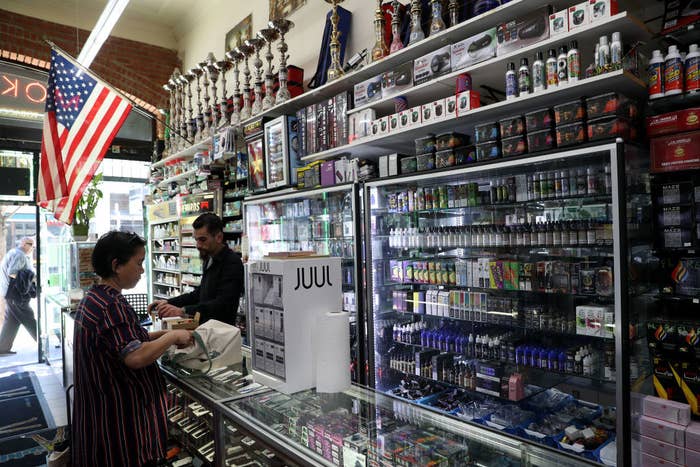
Most vape shops might end up being, well, vaporized following the passing of an FDA deadline on Wednesday for legalizing some 400 million varieties of nicotine-laced liquids nationwide.
Vaping liquids have long been sold in a legal gray zone, placed under FDA regulation only four years ago. But under an April federal court order in an American Academy of Pediatrics lawsuit, vape shops and manufacturers were required to file FDA “premarket review” applications for vaping flavors, proving they benefit public health, by Sept. 9.
Once an application is sent to the FDA, the maker is allowed to sell the flavor for a year, unless the agency takes action. So far, Philip Morris’s heated tobacco device IQOS and Snus from Swedish Match are the only two tobacco products to have received such approval. Juul, which in 2017 was the largest e-cigarette company in the US, submitted its application in July.
But unlike those large firms, the vast majority of vape shop owners and manufacturers see themselves as caught in the crossfire because they can’t afford to submit the lengthy, costly applications. These businesses, which number about 13,000 nationwide, largely sell liquids that are meant to be added to vaping pens and other devices.
Nobody knows exactly what happens after Wednesday. Many stores might go on quietly selling vapes unless or until the FDA or local health agencies act on complaints, since the agency in January indicated it would instead prioritize policing vaping products aimed at teens. The COVID-19 pandemic has also put vape shop inspections on hold, according to the agency.
The industry says the deadline, already delayed once in May by the pandemic, will drive many vape shops out of business and send smokers back to more harmful cigarettes. But health organizations that are suspicious that vaping is hooking teens on nicotine, and fueling future tobacco smoking, call the move long overdue.
“The whole thing will leave the industry in never-never land, with the FDA saying everything will be on a case-by-case basis,” Mark Anton of the Smoke-Free Alternatives Trade Association, which represents vape shops, told BuzzFeed News. In the long run, though, he argued it will be impossible to get a loan or sign a lease under threat of legal action, which will lead to stores closing. “I worry it will be Armageddon for the vaping industry.”
In 2018, a National Academies of Sciences, Engineering, and Medicine review found that vaping can lead to future tobacco smoking in teens and also help adults kick the habit. This combustible mixture of benefits and harms — while clearly posing less of a health risk than cigarettes, which cause some 480,000 deaths a year in the US — has been at the center of the long-running fight over whether vaping’s threat to kids outweighs its help to adult former smokers.
And while several studies have suggested that smoking is linked to severe COVID-19 cases, likely due to the respiratory pathogen’s attack on damaged lungs, recent research is also suggesting that vaping poses risks, too.
“Although we do not know how many applications will be submitted by the September deadline, we do know that there are over 400 million deemed products,” Mitch Zeller, director of the FDA’s Center for Tobacco Products, said in an Aug. 31 guide document to vape shops. He acknowledged the agency was unlikely to be able to review that many vape flavors in the year set for its review. To date, the FDA has received applications for around 2,000 products, he said, adding that the agency has processed 40% of those.
Some vape shops are closing ahead of the deadline, citing the costs of complying with the FDA application’s demands for safety testing, science reviews, marketing materials, and a “Youth Action Prevention Plan” for each flavor, with each package estimated by the agency to cost anywhere from $117,000 to $466,000.
The public health proof they must offer is a higher standard than tobacco cigarettes, grandfathered under past law, must meet. Each store might sell thousands of variations of flavor, nicotine dosage, weight, and packaging of vaping liquids, and each one requires an application. Although the FDA has offered a pathway for bundled applications of related vaping products, the total price for all those applications would run still into the trillions of dollars for the $8 billion industry, Anton told BuzzFeed News. “The costs are impossible for small businesses,” he said.
Health groups are unsympathetic. “The industry has had four years to get ready to submit these applications,” said Matthew Myers of the Campaign for Tobacco-Free Kids, a party to the AAP lawsuit. “Instead they hired high-priced lobbyists when they should have funded scientific studies into the safety of their products.”
An increase in youth vaping in recent years, tied to the explosive sales of Juul e-cigarettes, has sharpened the vaping debate. A 2019 CDC survey found 27.5% of high school students reported e-cigarette use. Last year’s epidemic of lung injuries among people who vaped illicit e-liquids laced with Vitamin E acetate upped the furor over vaping as well, connected by a Trump administration effort to ban most e-cigarette flavors earlier this year.

